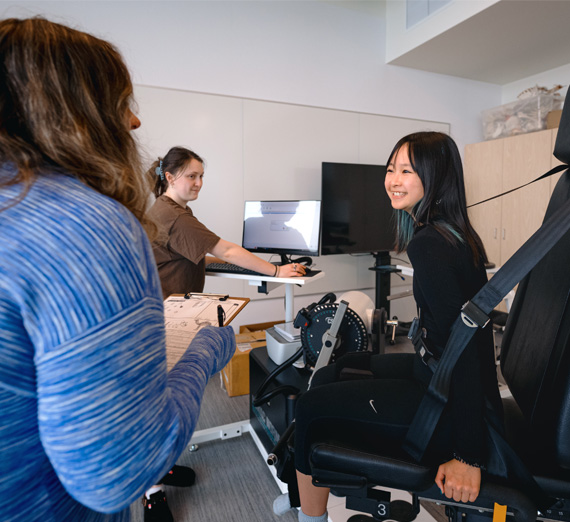The Influences of Balance: Research for older adults and those with Parkinson’s

The fear of falling can be a daily strain on older adults and people with Parkinson’s disease. How can strengthening the lower extremities help?
Through the McKinstry Fellows Research Program – which pairs students and faculty from the University of Washington School of Medicine-Gonzaga University Health Partnership – undergrads from Gonzaga and medical students from the UW sought to answer that question.
Surya Sankar, Gonzaga, and Claire Schaef, UWSOM-Spokane, worked with Clint Wutzke, associate professor of Human Physiology at Gonzaga, on this project aimed at identifying factors associated with balance and fear of falling.
“Approximately one-third of adults over the age of 65 experience a fall each year,” said Wutzke. “Although older adults are at an increased risk of a fall as they age, individuals with Parkinson’s disease (PD) have a greater risk of falling, as more than two-thirds of people with PD experience a fall each year.”
In this study, researchers examined how individuals use their lower extremities in balance and walking, comparing data from individuals with Parkinson’s to older adults without the disease.
“We had participants do a variety of activities including standing on a force plate during a balance test, walking in a hallway, and walking on different angles,” Schaef explained. “Participants wore sensors on their feet, calves and thighs.”
The students helped prepare the protocol and led the data collection.
Schaef appreciated how Sankar and Wutzke accommodated her schedule as she attended Navy Officer Development School in Newport, Rhode Island this summer.
“They were great to work with, and as an athlete, the research interested me,” said Schaef, who was a Division 1 swimmer in college. “I enjoyed analyzing movement. I hadn’t studied that before.”
Sankar, a human physiology major at GU, said the project fits well with her budding interest in research.
“I’d worked as a medical assistant in an urgent care clinic for a couple of years, so I was familiar with engaging with patients,” she said.
She appreciated the opportunity to work alongside a medical school student.
“I’ve considered pursuing a medical career, and I got a lot of great information from Claire,” said Sankar. “I got to hear what the balance between medical school and personal life looks like and what it takes to get into medical school. It’s nice to get a student’s perspective because I’d only heard from practicing physicians.”
Wutzke is pleased with the experiences the McKinstry Fellowships provides to students.
“This is exactly how I started in research as a student, but I had to seek out these experiences on my own,” he said. “This is a tremendous opportunity for undergrads and medical students to gain insight into research.”
